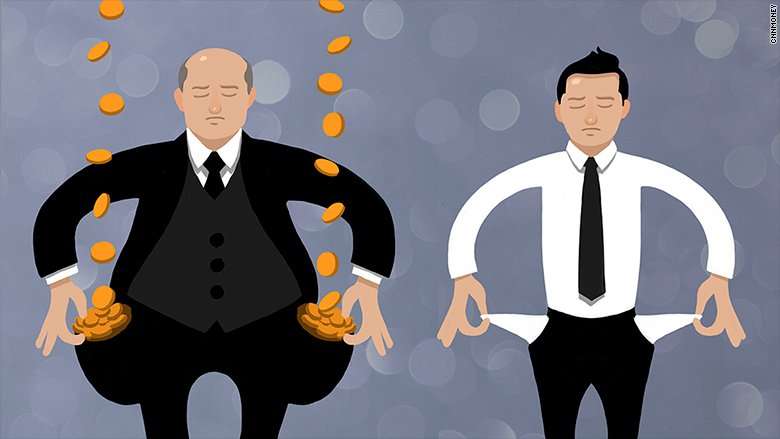More than $8 of every $10 of wealth created last year went to the richest 1%.
That's according to a new report from Oxfam International, which estimates that the bottom 50% of the world's population saw no increase in wealth.
Oxfam says the trend shows that the global economy is skewed in favor of the rich, rewarding wealth instead of work.
"The billionaire boom is not a sign of a thriving economy but a symptom of a failing economic system," said Winnie Byanyima, executive director of Oxfam International.
The head of the advocacy group argued that the people who "make our clothes, assemble our phones and grow our food" are being exploited in order to enrich corporations and the super wealthy.
The study, released ahead of the World Economic Forum in Davos, was produced using data from Credit Suisse's (CS) Global Wealth Databook.
Related: 5 ways the world is pulling apart
The report also highlights the detrimental effects of gender inequality with data that show more men own land, shares and other capital assets than women.
Rising inequality has been a major topic at Davos for years.
Oxfam said Monday that it is time for the global elite to stop talking about inequality and start changing their ways.
"It's hard to find a political or business leader who doesn't say they are worried about inequality. It's even harder to find one who is doing something about it," said Byanyima.
"Many are actively making things worse by slashing taxes and scrapping labor rights," she added.
Related: Thought 2017 was bad? 2018 could be much worse
Oxfam said that governments should focus on policies that would lead to fairer distribution of wealth and stronger workers' rights.
These could include introducing a living wage, supporting labor unions and tackling gender discrimination.
Governments also need to tackle tax avoidance and put limits on shareholder returns and executive pay, Oxfam said. The group argues companies should not issue dividends to shareholders unless they pay their workers a living wage.
Oxfam also said that tax policies should be used to reduce extreme wealth.

PaperBoxPhone on April 3rd, 2018 at 01:35 UTC »
Keeping this in prospective, this includes all the poor countries.
redditor3000 on April 3rd, 2018 at 01:30 UTC »
Since this article is talking about inequality on a global scale it's important to note that to be in the global 1% of income you only need to make $32,400 USD per year.
To be in the global 1% in terms of wealth, however, you need $770,000 USD in equity.
I don't mean to point this out to say that inequality isn't a huge problem. But I suspect many people reading this thread come from families that are part of the global top 5-1%.
https://www.investopedia.com/articles/personal-finance/050615/are-you-top-one-percent-world.asp
edit: A lot of people are mentioning that the cost of living is a lot higher in developed countries which is a good point.
This is a complex topic and I'm worried I'm giving people the wrong idea. Inequality is getting worse and is a huge problem. For the middle/working class in the developed world their wages have stagnated for the past 40 or so years.
I guess what I was trying to say was that the global 1% may not be the problem, but more that global .01% who make their money off capital gains and not labour.
To learn more about the topic I'd recommend Mark Blyth
Zombie_Jesus_ on April 3rd, 2018 at 01:15 UTC »
That's just the reported income too. Imagine those accounts that aren't claimed legally.